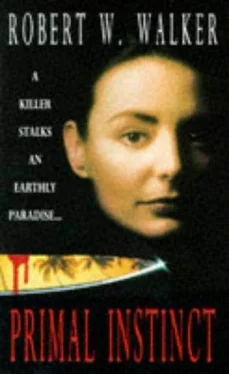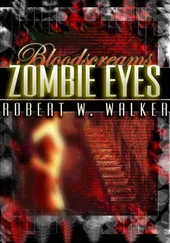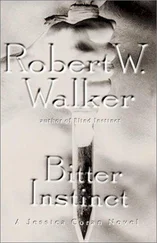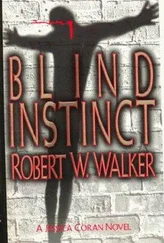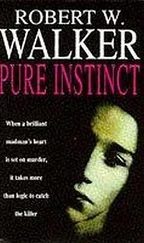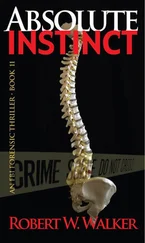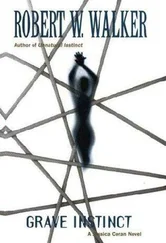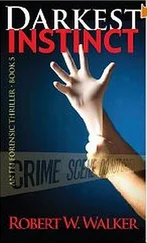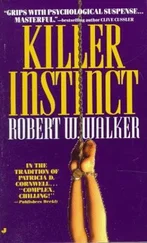Robert Walker - Primal Instinct
Здесь есть возможность читать онлайн «Robert Walker - Primal Instinct» весь текст электронной книги совершенно бесплатно (целиком полную версию без сокращений). В некоторых случаях можно слушать аудио, скачать через торрент в формате fb2 и присутствует краткое содержание. Жанр: Полицейский детектив, на английском языке. Описание произведения, (предисловие) а так же отзывы посетителей доступны на портале библиотеки ЛибКат.
- Название:Primal Instinct
- Автор:
- Жанр:
- Год:неизвестен
- ISBN:нет данных
- Рейтинг книги:3 / 5. Голосов: 1
-
Избранное:Добавить в избранное
- Отзывы:
-
Ваша оценка:
- 60
- 1
- 2
- 3
- 4
- 5
Primal Instinct: краткое содержание, описание и аннотация
Предлагаем к чтению аннотацию, описание, краткое содержание или предисловие (зависит от того, что написал сам автор книги «Primal Instinct»). Если вы не нашли необходимую информацию о книге — напишите в комментариях, мы постараемся отыскать её.
Primal Instinct — читать онлайн бесплатно полную книгу (весь текст) целиком
Ниже представлен текст книги, разбитый по страницам. Система сохранения места последней прочитанной страницы, позволяет с удобством читать онлайн бесплатно книгу «Primal Instinct», без необходимости каждый раз заново искать на чём Вы остановились. Поставьте закладку, и сможете в любой момент перейти на страницу, на которой закончили чтение.
Интервал:
Закладка:
His father's attempts to have more children became common knowledge, and everyone in the village spoke behind Lopaka's back about the evil the white blood in him had brought to the village, and how the chief could not possibly pass on his powers to this pale son.
An outsider who never fit in, he became a misfit at an early age, keeping to himself, living an all-but-mute existence, hearing not the voices of loving parents each night, but falling asleep to the whispered curses of anger, disappointment and distrust coming out of his own father.
For years he tried desperately to change his father's mind and the mind of the community, attempting to be him, mimicking the man, following him around like a dog, gazing up at him with admiration and feigned love. He wore the ceremonial lei and garb of the son of a chief, carried the ceremonial knives and clubs, and generally played the part fate had meted out to him in a pathetic attempt to win acceptance from everyone around him. At the same time, he secretly cursed his stepmother and asked the gods of the air and the earth to make her barren. Unable to have children, the stepmother was soon replaced by another, but she, too, could not give the chief another child, for Lopaka's evil magic was powerful. It was the first time the gods granted him his wish, and they opened his eyes to the true nature of his brother's death. It was a death that Lopaka knew in his heart had nothing whatever to do with the disease.
That healing lotion of his own brain that hid such horrors from the conscious child had placed the terror so far away that he'd lost all memory of it until the wind voices came to remind him. They opened his eyes to what his mind had closed on, that young, deformed Lopeko did not die of his illness but by the ceremonial sword belonging to his father. The gods told him that the hand wielding the sword had been his father's, that Lopeko had been an embarrassment to him.
No matter how he tried, Lopaka-a constant, brooding reminder to his father of all the taboos he'd broken-could never fit in, and in fact had good reason to fear for his own life; he was marked from birth and by the death of his twin, and there was no changing the public mind about him. There were other children in the village considered perfect, the epitome of the race, the last vestiges of it, in fact-children who were full-bloods, with rich smiles and warm, radiant 'ele'ele eyes that told of an ancient ancestry, their little bottoms and sturdy legs thick, their baby skin swarthy and their lives filled with freedom and happiness. And when one of their pet birds or dogs disappeared, found later to have been brutally slain with a long blade, it was held up as a warning to them to never tempt the demons of the night and the forests.
Lopaka's earliest memories of creating a state of non-existence in a living creature were now like the playful struggling and curiosity of a child over a complex jigsaw puzzle. Yet those first experiments in creating death where there had been life had stirred in him feelings and sexual emotions he'd never before touched. It was a kind of crude baptism for him, and his newfound religion quickly escalated when he began to lure smaller children into the forests, where he delighted in humiliating and hurting them, until one day a little girl named Alaya was found dead, her body brutally savaged and fed upon by the forest beasts and perhaps some supernatural demons known to lurk in the black shadows amid the mountains.
No one suspected that the demon was the boy who'd lured Alaya into those woods with promises; no one suspected-least of all the other children-not even those whom Lopaka had practiced his little tortures on. No one but his father. Yet Lopaka simply braved it out, strutting about, pretending to be his father, the little keiki ali'i, doling out justice and punishment at the court of his peers just as he'd seen his father, the ali'i kane, do a thousand times The gods sometimes told him that his father was not his true father, that they were; that Lopaka was spawned from the seed of the supernatural. He didn't at first believe this, but as he grew older, more and more signs pointed to the fact that he was not in any way like his father.
His first killing was unintentional. He was hardly into his teens at the time, and Alaya was a trusting eleven-year-old. He might not have killed her had she not had such a vile temper and nasty tongue, had she not screamed out what everyone else thought of him…
He recalls now with a cold and clear memory, like a photographer interested in light and shadow, just how slowly he eased the knife into the child's limb only to maim. She fainted immediately, and he, using one of his father's ceremonial blades, continued to cut. He had learned much from his father, how to get the most out of a torture victim. Still, it surprised him to learn when the little girl's blood gushed forward that he was moved to a higher plane of feeling. The next wound and subsequent ribbon of red lace over her throat so excited him that he was filled with delirious joy, a kind of ecstasy that forced a ritual dance from him.
He was sexually aroused by the little girl's pain, the suffering making him stiffen in his private parts, the blood begging him to taste of death, to take it on his fingers and lap it up…
The entire attack lasted only a few minutes, but within that compressed moment he'd stabbed the girl thirty, perhaps forty times before he was completely spent, using his blade as his penis, totally destroying her. The act blotted out all of her kind-anyone who dared question him or despise him.
It was the first time that his subconscious had authenticated the trinity, the three-way link between the voices in his head, his need for sexual arousal, and the fact he could only reach it through physical violence. Before this, any sexual arousal had been lukewarm and minimal at best, but now it was fiery and fullblown.
Memories, he thinks now, sitting behind the wheel of his clean, air-conditioned bus, have a place, but he prefers memories that arouse him sexually, so he draws most on memories of his recent bloodlettings.
The little bus he drives now bumps off busy H-l, Kamehameha Freeway, and runs the familiar and crowded off-ramp to Pearl Harbor. The bus winds its way around to the lawns of the well-kept entrance of Pearl Harbor, toward the site of the U.S.S. Arizona Memorial, with its bones entombed underwater. Lopaka's passengers, fully two-thirds being curious Japanese citizens with cameras in hand, are prepared to record what they consider their history, regardless of what American textbooks say about the war in the Pacific.
So together, American and Japanese tourists, along with Australians, New Zealanders, Europeans and others from around the globe, will go by solemn Coast Guard cutter out to the sunken World War II battleship. There, shoulder to shoulder, they'll read the list of names in alphabetical order on a “wailing wall” monument, the names of privates and noncoms, officers and marines, from H. Aaron to M. Zwarun, Jr. Then the tourists will stand over the underwater tomb of over eleven hundred men, a 184-foot crypt of shattered metal seen clearly through the crystal waters of the harbor only four feet below the concrete platform built over the forecastle of the sunken ship, a liquid rainbow of leaking oil still rippling over the stern after fifty years.
The bus comes to a jerking stop, and the door opens with a swishing sound; Lopaka gets off the bus with his passengers, leads them like children to the gate and haggles with the ticket-handler for twenty-four discounts for his tour group, discounts they're to receive for riding the Enoa Bus Line. He sleepwalks through the process and then tells his passengers where and when to meet after the sightseeing is finished. This done, he returns to his bus and takes it out of the entrance lanes, to park and wait and think more about tonight, about Hiilani, whom he has finally chosen.
Читать дальшеИнтервал:
Закладка:
Похожие книги на «Primal Instinct»
Представляем Вашему вниманию похожие книги на «Primal Instinct» списком для выбора. Мы отобрали схожую по названию и смыслу литературу в надежде предоставить читателям больше вариантов отыскать новые, интересные, ещё непрочитанные произведения.
Обсуждение, отзывы о книге «Primal Instinct» и просто собственные мнения читателей. Оставьте ваши комментарии, напишите, что Вы думаете о произведении, его смысле или главных героях. Укажите что конкретно понравилось, а что нет, и почему Вы так считаете.
